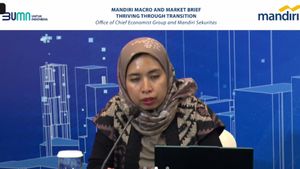JAKARTA - Chief Economist of PT Bank Mandiri Tbk Andry Asmoro stated that Indonesia's economic challenges will come in the second and third quarters of 2024.
"For our own domestic economy, yesterday's national election provided a performance boost for the first quarter of 5.11 percent to grow, only we see the challenge not in the first quarter, but in the second quarter, the third quarter," Andry said as quoted by ANTARA, Tuesday, May 14.
Indonesia's economic growth in the first quarter of 2024 reached 5.11 percent, higher than 5.04 percent in the previous quarter.
This achievement was driven by the acceleration of government spending, especially regarding the general election (election) which also coincided with the payment of holiday allowances (THR) in line with Ramadan 1445 Hijri.
The level of household consumption which still grew positively by 4.91 percent with a contribution to gross domestic product (GDP) of 54.93 percent in the first quarter of 2024 is one of the drivers of economic growth.
The first quarter has received a tremendous boost in terms of politics, election, and also from the fasting month and Eid. While Eid is in early April, maybe April's performance is still a little good, it will start a challenge in May and June. In June there is a back to school period, the holiday season too, this usually has an impact on the retail sector or FMCG (Fast-moving Consumer Goods)," said Andry.
Indonesia's economic challenges are influenced by geopolitical risks due to the escalation of conflicts in the Middle East which are driving an increase in oil prices, as well as triggering global financial market volatility.
The rupiah exchange rate was appreciated for touching the position of Rp. 16,260 per United States (US) dollar, the weakest since 2020. Responding to this situation, Bank Indonesia at the Board of Governors' Meeting (RDG) in April 2024 raised the BI Rate benchmark interest rate by 25 bps (basis points) to 6.25 percent to maintain the stability of the domestic financial market.
The weakening of global economic conditions has an impact on investment components and trade balances. Investment growth in the first quarter still tends to be slow, mainly due to low non-construction investment. The performance of the trade balance still records a surplus even though the value continues to decline.
SEE ALSO:
This means that the potential for future risks are still large due to the ongoing global geopolitical turmoil, rising energy and food prices, as well as the pressure from the issuance of foreign portfolio investments that have caused the strengthening of the United States (US) dollar. However, the Indonesian economy is estimated to be quite resilient in facing global turmoil.
The series of stages of the Presidential Election (Pilpres) is considered to encourage the confidence of economic actors to expand.
In addition, the upcoming Regional Head Election (Pilkada) stage can also provide a boost to consumption growth.
Bank Mandiri projects that the Indonesian economy will still record healthy growth at 5.06 percent in 2024.
The English, Chinese, Japanese, Arabic, and French versions are automatically generated by the AI. So there may still be inaccuracies in translating, please always see Indonesian as our main language. (system supported by DigitalSiber.id)















